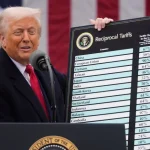
Authored by J.B.Shurk via The Gatestone Institute,
The heavy perils we face today include centralized governments micromanaging society, the growing prospect of global war, the growing prospect of forced surrender, and the replacement of reasoned debate and free speech with state-sanctioned "narratives" and censorship: totalitarian governance seems not far behind. This is a new kind of war against civilians for control of their minds.
The torrents engulfing us appear to be potentially catastrophic. In a few short years, the world has endured the COVID-19 pandemic, forced government lockdowns, extreme economic volatility, commodity shortages, and the World Economic Forum's attempts to exploit this cascade of crises as an excuse to usher in a structural "Great Reset" in which global food and energy consumption can be strictly regulated according to the "climate change" goals of an unelected cabal. Governments are relying increasingly on controlling public "narratives" and vilifying dissent.
While health bureaucrats and politicians claimed to be "following the science," mandatory compliance with unilateral rule-making precluded reasoned, good-faith debate. The predictable result: the lethal consequences of the Wuhan Virus were exacerbated by the lethal consequences of misguided public policies imposed to fight the virus. Students whose schools were shuttered now suffer the lifelong effects of learning loss. Patients whose timely diagnoses and preventative care were forestalled now suffer the debilitating outcomes of untreated disease. Small businesses unable to endure prolonged closures are gone for good. Middle class savings once reserved for unexpected "rainy day" funds or children's future educations have dried up. Credit card debt is on the rise, while more and more people struggle to survive on less. The "safety nets" of government welfare programs have ballooned to leave nation states more indebted than ever but have also proved too perforated with leaky holes (often draining needed resources straight into the bank accounts of corporate campaign donors, interest group lobbyists, and foreign hackers) to keep society's most vulnerable afloat. Governments' justifications for reckless fiscal, monetary, and credit policies during short-term emergencies have weakened nations' prospects for long-term solvency and the likelihood that they will be capable of preserving stable currencies. Still, for all the harms their actions have caused, governments have issued no apologies for enforcing such life-altering policies while silencing critics. It is as if "narrative engineers" have adopted an official position that they are incapable of being wrong.
Geopolitical conflict is wrenching the post-WWII international order apart. While America's and the European Union's "climate change" policies have already inflated the costs of energy, food and much else, Russia's invasion of Ukraine has only added to ordinary Europeans' financial pain and jeopardizes the continent's security more broadly. China's territorial ambitions threaten peace in Taiwan, Japan, across Southeast Asia and beyond. The United States' efforts to enlarge NATO's European membership, while expanding its mission objectives into the Indo-Pacific, all but ensure that the U.S., China and Russia remain on a collision course.
Policymakers cannot help seeing parallels to the quickly falling geopolitical dominoes that ushered in WWI and WWII over the course of a few fateful weeks. They cannot help looking at the unsustainable accumulation of government debt around the world and the avalanche of investment derivatives balancing unsteadily upon fragile currencies unmoored from any real value in gold or silver and fearing the risks of a severe depression. They cannot help seeing Russian revanchism and Chinese territorial expansion as signs that the Great Powers have set course down a dangerous path. The more nervous about the future policymakers are, the more committed they seem to enforcing a standard "narrative" they can control.
It was the detonation of two nuclear warheads over Hiroshima and Nagasaki, of course, that brought combat in the Pacific Theater to a close and ended WWII with an exclamation point.
Now we stand on a new kind of battlefield. Just as with nuclear weapons, civilians have nowhere to hide from this war's effects. Weapons systems are spread out across the Internet, deployed on mobile phones and active on every computer chip, tracking, sharing, and pushing digital information throughout the world. Instead of explosives and bullets, we have competing "narratives" whizzing past. The breadth of the campaign to control what information we see, how we process that information, and ultimately what we think and say makes even the most effective psychological operations of the past look antiquated and rudimentary. Whereas "mutually assured destruction" has so far succeeded as a deterrent against nuclear war, the tantalizing opportunities for governments to use programs of mass digital surveillance and communication to spread lies, manipulate opinion, and affect human behavior have created a kind of mutually assured dystopia, "where people lead dehumanized, fearful lives."
In the 1930s, Adolf Hitler spoke with boisterous energy and theatrical gesticulation before tens of thousands of stormtroopers, Hitler Youth, and Nazi Party faithful. Today, the dictator's raised stage has been replaced with Twitter, Facebook, YouTube, TikTok, and anywhere else a pop-up online audience can be found. The visual stimuli that enthralled Hitler's crowds are now reproduced with the release of pleasure-causing endorphins rushing to the brain after every "politically correct" online statement is "rewarded" with approval from strangers providing instant fame. Online "influencers" have become the goose-stepping middlemen for campaigns of mass propaganda that touch more humans in a day than a decade of Hitler's speeches. In an age when information has never been more easily accessible, the world is awash in lies.
Instead of encouraging public debate and rational argument, governments push the constant drumbeat of the "narrative" above all else. A citizen either obediently accepts the government's vast and intrusive COVID-19 rules, or that person is labeled a "COVID denier." A citizen either obediently accepts the government's vast and intrusive "climate change" rules, or that person is labeled a "climate denier." A citizen either accepts Hunter Biden's "laptop from hell" as "Russian disinformation", or that person is labeled a "Russian sympathizer." Daring to say otherwise could get one banned from social media, professionally sanctioned, or even fired from a job. Except none of these established "narratives" has proved true.
In hindsight, it is clear that lockdowns unleashed more health, educational and economic problems than they solved. As Europe faces an expanding energy crisis that leaves its populations vulnerable to the cold, it is clear that "climate change" policies can kill those they are purportedly meant to protect. And as Elon Musk's recent release of internal Twitter communications proves, Hunter Biden's laptop was not only real news censored from the public during a presidential election. Political speech was also censored through the collaborative efforts of the FBI and more than 50 intelligence community agents in violation of the First Amendment. In each case, the "narrative" proved to be either misleading propaganda or an outright lie. Yet they were created and sustained by online communication platforms that pushed the lies and excluded the truths.
As global events increasingly threaten Western stability, governments have demonstrated no inclination to entertain a diversity of viewpoints or discussions along the way. Instead, the more serious the issue, the more committed to a single, overarching "narrative" they seem to become. Dissent is despised. Reasoned argument is lampooned. A citizen is expected to blithely accept government-approved messaging disseminated online, or risk the wrath of the technocracy.
This war for eight billion minds means that citizens must be more vigilant than ever in processing and evaluating what they see and read. Whether they like it or not, they are under attack at all times from those who seek to manipulate and control them. As in the last century, we are surrounded by totalitarian propaganda routinely disguised as "the truth." In this century, though, the reach and scale of mass indoctrination seems endlessly expanding.
Authored by J.B.Shurk via The Gatestone Institute,
The heavy perils we face today include centralized governments micromanaging society, the growing prospect of global war, the growing prospect of forced surrender, and the replacement of reasoned debate and free speech with state-sanctioned “narratives” and censorship: totalitarian governance seems not far behind. This is a new kind of war against civilians for control of their minds.
The torrents engulfing us appear to be potentially catastrophic. In a few short years, the world has endured the COVID-19 pandemic, forced government lockdowns, extreme economic volatility, commodity shortages, and the World Economic Forum’s attempts to exploit this cascade of crises as an excuse to usher in a structural “Great Reset” in which global food and energy consumption can be strictly regulated according to the “climate change” goals of an unelected cabal. Governments are relying increasingly on controlling public “narratives” and vilifying dissent.
While health bureaucrats and politicians claimed to be “following the science,” mandatory compliance with unilateral rule-making precluded reasoned, good-faith debate. The predictable result: the lethal consequences of the Wuhan Virus were exacerbated by the lethal consequences of misguided public policies imposed to fight the virus. Students whose schools were shuttered now suffer the lifelong effects of learning loss. Patients whose timely diagnoses and preventative care were forestalled now suffer the debilitating outcomes of untreated disease. Small businesses unable to endure prolonged closures are gone for good. Middle class savings once reserved for unexpected “rainy day” funds or children’s future educations have dried up. Credit card debt is on the rise, while more and more people struggle to survive on less. The “safety nets” of government welfare programs have ballooned to leave nation states more indebted than ever but have also proved too perforated with leaky holes (often draining needed resources straight into the bank accounts of corporate campaign donors, interest group lobbyists, and foreign hackers) to keep society’s most vulnerable afloat. Governments’ justifications for reckless fiscal, monetary, and credit policies during short-term emergencies have weakened nations’ prospects for long-term solvency and the likelihood that they will be capable of preserving stable currencies. Still, for all the harms their actions have caused, governments have issued no apologies for enforcing such life-altering policies while silencing critics. It is as if “narrative engineers” have adopted an official position that they are incapable of being wrong.
Geopolitical conflict is wrenching the post-WWII international order apart. While America’s and the European Union’s “climate change” policies have already inflated the costs of energy, food and much else, Russia’s invasion of Ukraine has only added to ordinary Europeans’ financial pain and jeopardizes the continent’s security more broadly. China’s territorial ambitions threaten peace in Taiwan, Japan, across Southeast Asia and beyond. The United States’ efforts to enlarge NATO’s European membership, while expanding its mission objectives into the Indo-Pacific, all but ensure that the U.S., China and Russia remain on a collision course.
Policymakers cannot help seeing parallels to the quickly falling geopolitical dominoes that ushered in WWI and WWII over the course of a few fateful weeks. They cannot help looking at the unsustainable accumulation of government debt around the world and the avalanche of investment derivatives balancing unsteadily upon fragile currencies unmoored from any real value in gold or silver and fearing the risks of a severe depression. They cannot help seeing Russian revanchism and Chinese territorial expansion as signs that the Great Powers have set course down a dangerous path. The more nervous about the future policymakers are, the more committed they seem to enforcing a standard “narrative” they can control.
It was the detonation of two nuclear warheads over Hiroshima and Nagasaki, of course, that brought combat in the Pacific Theater to a close and ended WWII with an exclamation point.
Now we stand on a new kind of battlefield. Just as with nuclear weapons, civilians have nowhere to hide from this war’s effects. Weapons systems are spread out across the Internet, deployed on mobile phones and active on every computer chip, tracking, sharing, and pushing digital information throughout the world. Instead of explosives and bullets, we have competing “narratives” whizzing past. The breadth of the campaign to control what information we see, how we process that information, and ultimately what we think and say makes even the most effective psychological operations of the past look antiquated and rudimentary. Whereas “mutually assured destruction” has so far succeeded as a deterrent against nuclear war, the tantalizing opportunities for governments to use programs of mass digital surveillance and communication to spread lies, manipulate opinion, and affect human behavior have created a kind of mutually assured dystopia, “where people lead dehumanized, fearful lives.”
In the 1930s, Adolf Hitler spoke with boisterous energy and theatrical gesticulation before tens of thousands of stormtroopers, Hitler Youth, and Nazi Party faithful. Today, the dictator’s raised stage has been replaced with Twitter, Facebook, YouTube, TikTok, and anywhere else a pop-up online audience can be found. The visual stimuli that enthralled Hitler’s crowds are now reproduced with the release of pleasure-causing endorphins rushing to the brain after every “politically correct” online statement is “rewarded” with approval from strangers providing instant fame. Online “influencers” have become the goose-stepping middlemen for campaigns of mass propaganda that touch more humans in a day than a decade of Hitler’s speeches. In an age when information has never been more easily accessible, the world is awash in lies.
Instead of encouraging public debate and rational argument, governments push the constant drumbeat of the “narrative” above all else. A citizen either obediently accepts the government’s vast and intrusive COVID-19 rules, or that person is labeled a “COVID denier.” A citizen either obediently accepts the government’s vast and intrusive “climate change” rules, or that person is labeled a “climate denier.” A citizen either accepts Hunter Biden’s “laptop from hell” as “Russian disinformation“, or that person is labeled a “Russian sympathizer.” Daring to say otherwise could get one banned from social media, professionally sanctioned, or even fired from a job. Except none of these established “narratives” has proved true.
In hindsight, it is clear that lockdowns unleashed more health, educational and economic problems than they solved. As Europe faces an expanding energy crisis that leaves its populations vulnerable to the cold, it is clear that “climate change” policies can kill those they are purportedly meant to protect. And as Elon Musk’s recent release of internal Twitter communications proves, Hunter Biden’s laptop was not only real news censored from the public during a presidential election. Political speech was also censored through the collaborative efforts of the FBI and more than 50 intelligence community agents in violation of the First Amendment. In each case, the “narrative” proved to be either misleading propaganda or an outright lie. Yet they were created and sustained by online communication platforms that pushed the lies and excluded the truths.
As global events increasingly threaten Western stability, governments have demonstrated no inclination to entertain a diversity of viewpoints or discussions along the way. Instead, the more serious the issue, the more committed to a single, overarching “narrative” they seem to become. Dissent is despised. Reasoned argument is lampooned. A citizen is expected to blithely accept government-approved messaging disseminated online, or risk the wrath of the technocracy.
This war for eight billion minds means that citizens must be more vigilant than ever in processing and evaluating what they see and read. Whether they like it or not, they are under attack at all times from those who seek to manipulate and control them. As in the last century, we are surrounded by totalitarian propaganda routinely disguised as “the truth.” In this century, though, the reach and scale of mass indoctrination seems endlessly expanding.
Loading…






